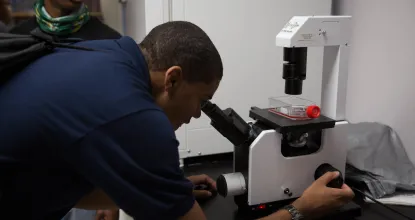CLS Concentration: Diagnostic Genetics Overview
***As of the Fall of 2023, the diagnostic genetics major is no longer active***
The major of diagnostic genetics can be divided into two specialties: molecular biology and cytogenetics. Both laboratory specialties use genetic testing to aid in the prevention, diagnosis and treatment of disease. Students work with methods that isolate DNA and chromosomes, depending on the specialty. Students are exposed to a broad range of sophisticated instruments, procedures and disease procedures. Emphasis is placed on ingenuity, exact technique and careful attention to process, and using cutting edge technology.
The program offers two tracks: cytogenetics and molecular biology. These tracks require the same course work at NMU, but differ in the senior practicum.
Clinical Practicum
The new diagnostic genetics program features a training experience at Mayo Clinic. Students can choose a six-month practicum in the field of cytogenetics or a six-month practicum in the field of molecular biology to satisfy the requirements for the major in diagnostic genetics.
The six-month practicum, or training program, includes an intense experience in all aspects of the particular field chosen, including:
- Proficiency in various techniques
- Using state-of-the-art technology
- Conducting professional studies and projects
The practicum is a 40-hour a week obligation under the direct supervision of the Mayo Clinic laboratory personnel and is taken by students as their last semester of course work. Upon completion of the practicum and all degree requirements, students are eligible to take the national certification exams in cytogenetic technology or molecular biology technology. The job market is outstanding and the experience at Mayo Clinic is second to none.
